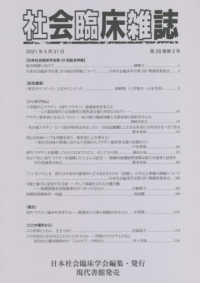- ホーム
- > 洋書
- > 英文書
- > History / World
Full Description
In a book that is at once a major contribution to modern European history and a cautionary tale for today, Isabel V. Hull argues that the routines and practices of the Imperial German Army, unchecked by effective civilian institutions, increasingly sought the absolute destruction of its enemies as the only guarantee of the nation's security. So deeply embedded were the assumptions and procedures of this distinctively German military culture that the Army, in its drive to annihilate the enemy military, did not shrink from the utter destruction of civilian property and lives. Carried to its extreme, the logic of "military necessity" found real security only in extremities of destruction, in the "silence of the graveyard."Hull begins with a dramatic account, based on fresh archival work, of the German Army's slide from administrative murder to genocide in German Southwest Africa (1904-7). The author then moves back to 1870 and the war that inaugurated the Imperial era in German history, and analyzes the genesis and nature of this specifically German military culture and its operations in colonial warfare. In the First World War the routines perfected in the colonies were visited upon European populations. Hull focuses on one set of cases (Belgium and northern France) in which the transition to total destruction was checked (if barely) and on another (Armenia) in which "military necessity" caused Germany to accept its ally's genocidal policies even after these became militarily counterproductive. She then turns to the Endkampf (1918), the German General Staff's plan to achieve victory in the Great War even if the homeland were destroyed in the process—a seemingly insane campaign that completes the logic of this deeply institutionalized set of military routines and practices. Hull concludes by speculating on the role of this distinctive military culture in National Socialism's military and racial policies.Absolute Destruction has serious implications for the nature of warmaking in any modern power. At its heart is a warning about the blindness of bureaucratic routines, especially when those bureaucracies command the instruments of mass death.
Contents
IntroductionPart I: Suppression Becomes Annihilation: Southwest Africa, 1904-1907
1. Waterberg
2. Pursuit and Annihilation
3. Death by ImprisonmentPart II: Military Culture
4. National Politics and Military Culture
5. Lessons of 1870-71: Institutions and Law
6. Standard Practices
7. Doctrines of Fear and Force
8. Stopping the ProcessPart III: The First World War
9. Waging War, 1914-1916: Risk, Extremes, and Limits
10. Civilians as Objects of Military Necessity
11. The Armenian Genocide
12. Repetition and Self-DestructionsConclusions and ImplicationsBibliography
Index








